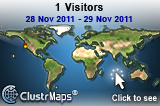Brenda Zulu interviews Ndesanjo Macha, the Regional Editor for Sub Saharan Africa (Global voices) at Highway Africa.
He says: "Mobile technologies are cheaper, they do not require the infrastructure and investment other technologies need...Africa has the fastest growing number of subscribers....mobile phones are the key to producing content, sharing content, reading, looking at pictures and images, and even doing businesses."
He describes how mobile technology facilitates rural development and participation, linking rural farming communities with the global public sphere; mobile blogging; and mobile reporting.
Check out the blog at Web2fordev.net for other great content. Hat tip to Christian Kreutz!

